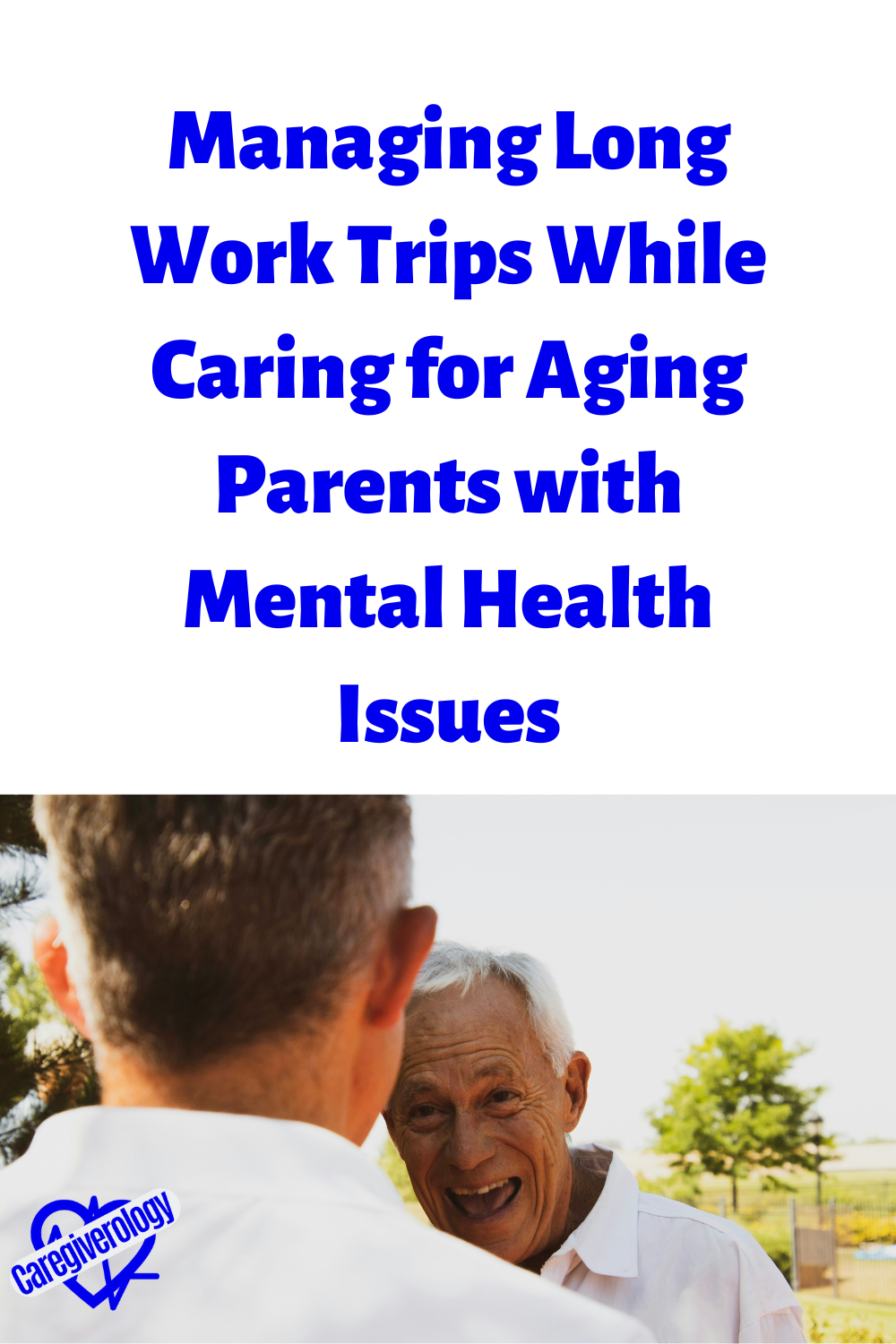Managing Long Work Trips While Caring for Aging Parents with Mental Health Issues

Managing a demanding work schedule alongside the responsibility of caring for aging parents with mental health issues is a formidable challenge. AARP's 2023 data reveals that 61% of family caregivers work full or part-time, often dedicating 20-29 hours weekly to caregiving. This intense workload contributes to 40% to 70% experiencing clinical depression and 23% reporting negative physical health impacts.
In this article, we offer practical strategies for managing long work trips while ensuring high-quality care. We aim to provide solutions to reduce stress and support loved ones effectively.
Assessing Your Parents' Needs
Before setting off on a long work trip, it's essential to evaluate your parent's needs and the level of care they will require. Review their physical and mental health conditions, daily routines, and medication requirements. This assessment will help you spot any potential issues or gaps in their care that might occur while you're away.
Key factors to consider include:
- Physical health: Are they able to handle daily activities such as bathing, dressing, and cooking on their own?
- Mental health: Do they need ongoing monitoring or medication for mental health issues?
- Medication management: Can they take their medications correctly and on schedule?
- Social isolation: Are they at risk of feeling isolated or lonely?
- Financial management: Do they need help with managing finances or paying bills?
How often should I reassess my parents' needs as their condition changes?
Reassess your parents' needs every 3-6 months or when significant changes occur in their condition. Regular evaluations of their health, mental state, and daily requirements are crucial. These assessments help keep their care plan effective and responsive to evolving needs.
Creating a Comprehensive Care Plan
Develop a comprehensive care plan that covers medical needs, daily routines, and personal preferences. Include details on medications, therapy schedules, and emergency contacts. Collaborate with healthcare providers and family members to make sure the care plan is adaptable and provides clear instructions for personalized care.
Utilizing Technology for Remote Monitoring
NCBI states that utilizing digital health interventions can significantly enhance support for family caregivers and address the chronic stress and burden associated with caregiving. A review of multiple studies found that these tools improved caregivers’ psychological health, self-efficacy, and quality of life. Enhanced digital solutions can alleviate caregiving stress and improve overall well-being.
Enhance care through remote monitoring technologies like health apps, wearables, and security cameras. These tools allow real-time tracking of your parents' well-being, medication management, and safety. Choose user-friendly systems with alerts and easy access to critical information to stay connected and informed even from a distance.
Engaging Geriatric Psychiatry Services
Hiring a geriatric psychiatrist for regular home visits ensures your parents receive ongoing, personalized mental health care. This consistent approach allows for timely adjustments to their treatment plan and provides a thorough understanding of their unique needs.
When choosing a geriatric psychiatrist, seek board certification in geriatric psychiatry and relevant experience with elderly mental health conditions. Consider involving a certified psychiatric mental health nurse practitioner who offers specialized skills and comprehensive mental health support in a home setting.
Look for a PMHNP-BC, meaning a psychiatric mental health nurse practitioner who is board-certified. It signifies that the practitioner has completed stringent certification requirements and meets high standards in mental health practice. PMHNP-BCs are qualified to diagnose, treat, and manage mental health conditions, providing both medication management and psychotherapy, often in home environments.
Rockhurst University states that 32-35% of Missouri adults had severe depression symptoms from 2020 to 2023. About 27% of these individuals also experienced suicidal ideation. This data underscores a significant mental health crisis. Advanced training programs offer essential skills for effective intervention and support.
What questions should I ask a geriatric psychiatrist before hiring them?
Inquire about the geriatric psychiatrist’s experience with your parent’s mental health issues and their treatment methods. Also, discuss their approach to involving family in care. Ask about their availability for consultations and emergency support and how they collaborate with other healthcare providers to meet your parents' needs.
Preparing Your Home for a Caregiver’s Arrival
Guardian states with a rise in caregiving, now at 53 million adults, preparing your home for a caregiver involves adapting to demands. As 22% of working caregivers manage full-time jobs along with caregiving duties, optimizing the home environment is vital. This adjustment supports the caregiver and helps manage the increased strain.
Prepare your home by creating a safe, comfortable environment for both the caregiver and your parents. Ensure easy access to essential items, secure medications, and set up a private space for the caregiver. Providing detailed instructions and contact information will help ensure a smooth transition and high-quality care.
Maintaining Open Communication
American Heart Association states maintaining open communication is crucial in caregiving, particularly when discussing complex topics like finances and advance directives. Effective dialogue involves active listening, expressing needs honestly, and addressing difficult subjects with patience. Clear, assertive communication helps ensure that all family members understand each other’s concerns and expectations, ultimately reducing stress and fostering collaboration.
Handle disagreements or concerns with the caregiver promptly and professionally. Schedule regular check-ins to review care progress and address issues. Maintaining a collaborative approach focused on your parents' well-being is key. Ensure open communication among you, the caregiver, and other involved professionals to resolve conflicts and improve care quality.
How do I handle disagreements or concerns about care with the caregiver?
Address disagreements or concerns with the caregiver promptly and professionally. Hold regular meetings to review care progress and discuss issues. Focus on a collaborative approach, prioritizing your parents' well-being, and maintain open communication with the caregiver and professionals to resolve conflicts.
Managing Your Own Well-being
Bell & Associates highlights the importance of managing your well-being. They report that 23% of family caregivers have poor to fair health, with 72% skipping doctor visits. Around 55% neglect their medical appointments. Around 63% report poorer eating habits, and 58% experience worse exercise routines since taking on caregiving responsibilities, underscoring the importance of self-care.
Prioritizing personal health is essential, as many caregivers struggle with their well-being while managing caregiving responsibilities. Regular breaks and healthy routines can alleviate stress and prevent burnout, helping you manage both professional responsibilities and caregiving effectively.
Effective Caregiving During Long Work Trips
Successfully managing long work trips while caring for aging parents with mental health issues demands a thoughtful and balanced approach. By regularly assessing needs, creating detailed care plans, utilizing technology, and maintaining open communication, you can provide quality care. Balancing these responsibilities with self-care is crucial for navigating this challenging period with resilience and support.
Guest Articles Written for Caregiverology
From Managing Long Work Trips While Caring for Aging Parents with Mental Health Issues to Home
Recent Articles
-
Common Truck Crash Injuries and Legal Remedies - Caregiverology
Jul 19, 25 10:49 AM
Known for its sun-drenched beaches, vibrant arts scene, and bustling maritime industry, Fort Lauderdale is a city that sees heavy traffic both on its roads and at its busy port. Unfortunately, with th… -
Why Expert Legal Help Matters After Serious Injury - Caregiverology
Jul 19, 25 10:35 AM
In Houston, over 67,600 car crashes occurred in 2023, resulting in 290 fatalities and 1,612 serious injuries. That’s roughly 185 accidents every day. -
How Life Care Planners Support Injury Recovery - Caregiverology
Jul 19, 25 10:18 AM
In Los Angeles, life care planners play a vital role in supporting injury recovery, especially for individuals facing catastrophic injuries such as traumatic brain injuries or spinal cord damage.





New! Comments
Have something to say about what you just read? Leave a comment in the box below.